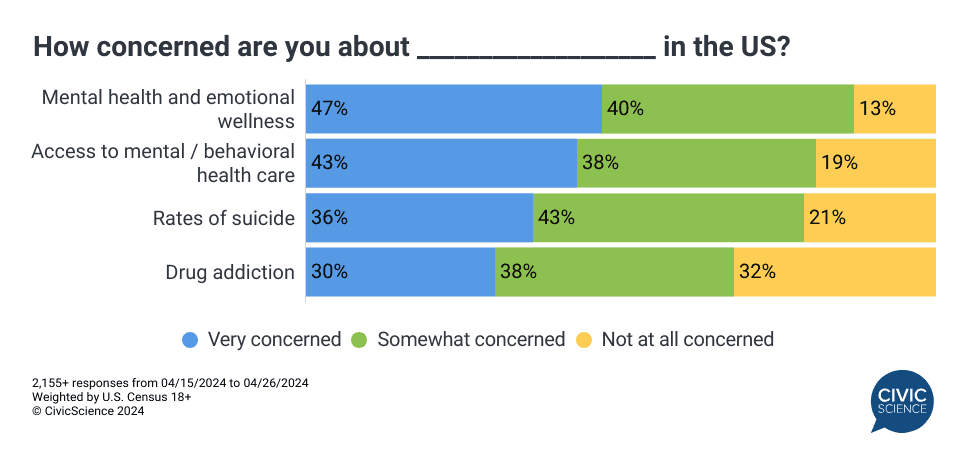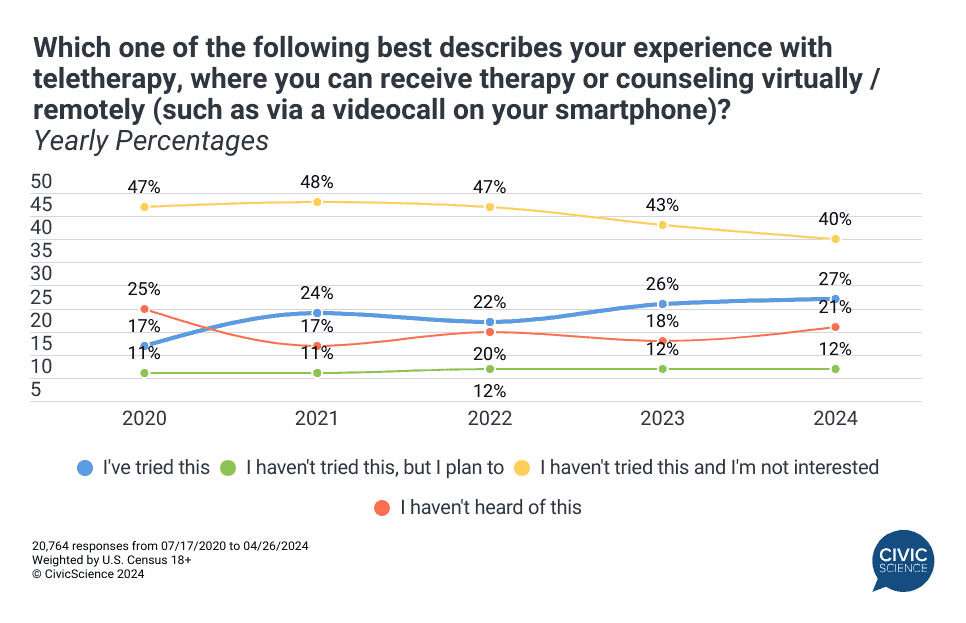CivicScience data has shown time and time again that understanding well-being is foundational to understanding consumer behavior. There’s simply no getting a complete sense of the modern American consumer without paying close attention to mental health and emotional well-being. Yet, apart from any implications for consumer behavior, mental health is also a crucially important topic in its own right – an enduring lesson from the COVID-19 pandemic, and one that initiatives like Mental Health Awareness Month (occurring in May) aim to bring into the public eye.
New findings from the CivicScience Mental/Behavioral Health & Wellness Report – freely available to download and share – show that most Americans express concern regarding mental health and its related issues in the United States, such as access to care, suicide rates, and drug addiction. Concern is strongest for overall mental health and emotional wellness, while access to mental and behavioral care is also high on the list.

And there is reason to be concerned – over half of U.S. households report they are managing mental health conditions, with depression being the most common. This is reflected in overall emotional well-being measured by the CivicScience Well-Being Index, as data show households managing depression, anxiety, and substance use conditions report notably lower well-being relative to the average U.S. adult.
Of course, mental health is about more than the presence or absence of a diagnosed mental health condition. Emotional health is dependent on a variety of demographic, social, cultural, and environmental factors. For example, well-being is especially high among adults over 65 living in a high-income household, and financially secure; on the other hand, it’s disproportionately low among younger adults, lower-income households, and LGBTQ+ adults.
Join the Conversation: How is your current state of mental health?
The growing concern over mental and emotional health in the U.S. is seen in the push for self-care across industries, including wellness and beauty. More Americans are also pursuing professional mental health care – ongoing tracking shows that use of all mental health treatments have increased in the past year, with medication and individual counseling remaining the most prevalent.
Teletherapy – which offers virtual or remote therapy or counseling – is one way that people are finding help. The use of teletherapy has increased by 10 percentage points in the past five years, and most users like the experience. As of this year, 27% of U.S. adults say they have tried teletherapy and an additional 12% of people are interested in trying it.

However, significant barriers to care persist. Cost remains the leading roadblock to receiving mental health care. And while data reveal most adults today support the idea that openly discussing mental health is a good thing, nearly 30% of people who delayed or avoided getting treatment over the past year did so because they don’t view mental health care as helpful and 21% don’t feel comfortable utilizing it.

Weigh In: How would you rank the availability of mental health care in the US?
The landscape of mental health and emotional wellness is changing in the U.S., as concern and acceptance grows, and more people adopt health care and counseling services such as teletherapy. Yet, there is still work to be done when it comes to reducing the stigma surrounding mental health and improving access to care, as 1-in-10 Americans feel they have nobody to talk to about their mental health.
For more in-depth insights into the state of mental health and emotional well-being, download the free report. To learn more about the benefits available to CivicScience clients, including access to more than 500K questions available in the CivicScience InsightStore™, get in touch.



